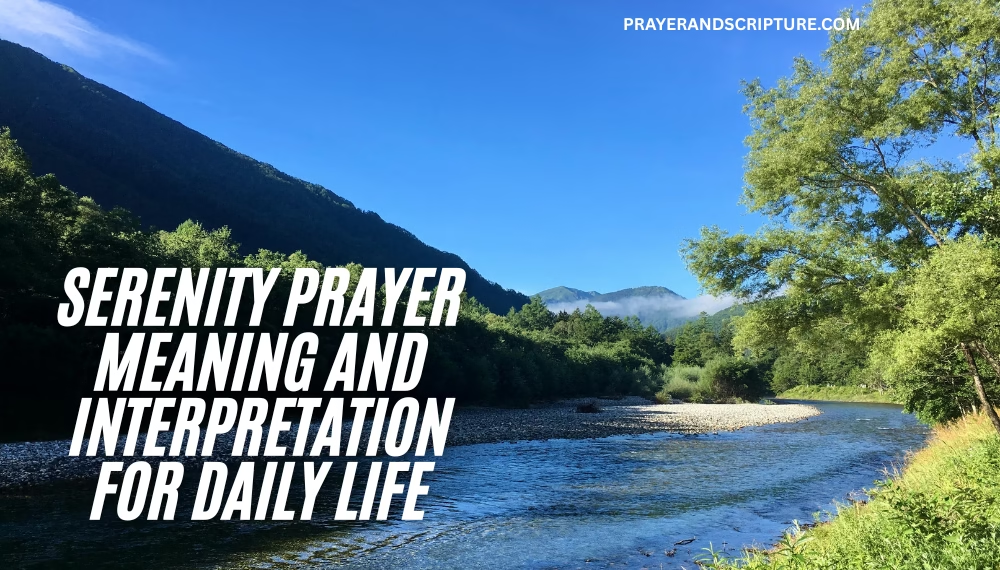The Serenity Prayer is one of the most beloved and timeless Christian prayers, offering hope, strength, and wisdom for daily life. With its simple yet powerful words—“God, grant me the serenity to accept the things I cannot change, courage to change the things I can, and wisdom to know the difference”—this prayer has guided millions of believers through seasons of peace, struggle, and growth.
In this devotional, we examine the true meaning of the Serenity Prayer and how it applies to your Christian journey today. Each line reflects deep biblical truth, encouraging believers to trust God’s sovereignty, act with courage, and seek divine wisdom. Whether you’re facing anxiety, uncertainty, or tough decisions, this prayer equips you to live with faith, clarity, and peace.
If you’ve ever asked, “What does the Serenity Prayer really mean, and how can it shape my life?”—this guide will walk you through a life-changing interpretation rooted in Scripture and daily application.
If you want to begin your day with calmness and clarity, try these short powerful morning prayers for Christians
What Is the Serenity Prayer? A Complete Meaning and Interpretation
The Serenity Prayer is one of the most powerful and widely known Christian prayers, often recited in times of difficulty, recovery, or decision-making. It begins with the famous words: “God, grant me the serenity to accept the things I cannot change, courage to change the things I can, and wisdom to know the difference.” While simple in wording, its meaning runs deep, offering timeless guidance for daily life, spiritual growth, and emotional peace.
At its core, the Serenity Prayer is a call to trust God’s sovereignty. The first phrase, “God, grant me serenity,” reminds us that peace is not something we manufacture on our own but a gift from God. Jesus affirms this in John 14:27 (NIV): “Peace I leave with you; my peace I give you. I do not give to you as the world gives. Do not let your hearts be troubled and do not be afraid.” Serenity flows from surrender, trusting God’s plan when circumstances are beyond our control. Build your trust daily by declaring God’s promises through Wednesday morning prayers of faith
The second line speaks of courage—the willingness to act when God prompts us to change something in our lives. This is echoed in Joshua 1:9 (ESV): “Be strong and courageous. Do not be frightened, and do not be dismayed, for the Lord your God is with you wherever you go.” True courage comes from knowing God walks with us in our decisions.
Finally, the request for wisdom highlights discernment—the ability to distinguish between what requires surrender and what requires action. Wisdom is promised to us in James 1:5 (NIV): “If any of you lacks wisdom, you should ask God, who gives generously to all without finding fault, and it will be given to you.”
In daily life, the Serenity Prayer teaches balance: surrendering to God in the uncontrollable, acting with faith where He calls us to move, and seeking wisdom for every decision. When prayed with sincerity, it becomes more than words—it becomes a spiritual compass for Christian living.
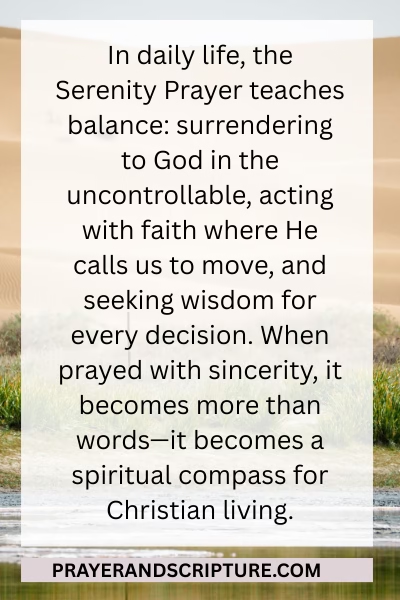
The Serenity Prayer Meaning for Daily Life and Spiritual Growth
The Serenity Prayer’s meaning for daily life goes far beyond its simple words—it is a daily guide for peace, courage, and wisdom that shapes our walk with God. In the busyness of life, we often wrestle with things beyond our control: people’s actions, unexpected challenges, or unanswered prayers. The Serenity Prayer reminds us to let go and rest in God’s will. “God, grant me the serenity to accept the things I cannot change.” This first phrase calls us to surrender. Instead of carrying burdens alone, we trust in Christ’s invitation: Matthew 11:28 (NIV): “Come to me, all you who are weary and burdened, and I will give you rest.”
The prayer also empowers us to face life’s responsibilities with faith. “Courage to change the things I can” is a call to action. It tells us that God does not want passive faith but an active one. Daily life requires us to step forward—whether in breaking harmful habits, pursuing holiness, or showing love where bitterness once lived. This courage is rooted in God’s strength, not ours. As Paul writes in Philippians 4:13 (ESV): “I can do all things through him who strengthens me.”
The final line—“And wisdom to know the difference”—is vital for spiritual growth. Wisdom helps us discern when to pray and wait, and when to act and obey. It prevents us from wasting energy on what God has not assigned to us, keeping our hearts focused on His will.
Applied daily, the Serenity Prayer keeps us grounded. It builds spiritual growth by aligning our emotions with God’s peace, shaping our character with courage, and refining our decisions through wisdom. Each morning, when you pray these words, you invite God to shape your outlook for the day. Over time, this daily practice leads to a deeper trust in Him, a stronger faith, and a more peaceful heart.
How to Interpret the Serenity Prayer in Modern Christian Living
The Serenity Prayer’s interpretation for modern Christian living is as relevant today as when it was first written. In a world filled with anxiety, constant change, and endless demands, this prayer provides a timeless roadmap for how believers can live with peace, strength, and clarity.
The opening request, “God, grant me the serenity to accept the things I cannot change,” challenges our tendency to control everything. Modern life pushes us toward self-reliance, but this line reminds us that true peace comes only through surrender. Psalm 46:10 (NIV) says, “Be still, and know that I am God.” Learning to release situations beyond our power frees us from worry and allows God’s will to unfold in His perfect timing.
The second line, “Courage to change the things I can,” speaks to the active side of faith. Christianity is not passive; it requires boldness to live counter-culturally in a world of compromise. From resisting temptation to standing for truth, we are called to make courageous decisions every day. As Paul encourages in 2 Timothy 1:7 (ESV): “For God gave us a spirit not of fear but of power and love and self-control.”
The final plea, “And wisdom to know the difference,” is where discernment enters. Modern Christian living involves countless choices—career, relationships, finances, and personal growth. Without God’s wisdom, we can waste time striving for what He never intended. James reminds us of God’s generous promise: James 1:5 (NIV): “If any of you lacks wisdom, you should ask God, who gives generously to all without finding fault, and it will be given to you.”
When interpreted for today’s world, the Serenity Prayer becomes a daily filter for decisions. It helps us accept life’s uncertainties, act in faith where change is needed, and trust God’s guidance for clarity. Living this way equips Christians not just to survive in a restless world but to thrive in God’s peace, demonstrating His light to others.
The Biblical Roots of the Serenity Prayer Explained
Though the Serenity Prayer was penned in the 20th century, its message is deeply rooted in biblical truth. Every line reflects timeless wisdom from Scripture, making it not just a prayer of comfort but a summary of Christian discipleship.
The opening phrase, “God, grant me the serenity to accept the things I cannot change,” echoes the biblical call to surrender. The Bible consistently reminds believers to trust God’s sovereignty rather than worry over uncontrollable circumstances. Philippians 4:6–7 (NIV): “Do not be anxious about anything, but in every situation, by prayer and petition, with thanksgiving, present your requests to God. And the peace of God, which transcends all understanding, will guard your hearts and your minds in Christ Jesus.” Serenity is not passive resignation—it is the peace of Christ at work in us.
The second petition, “Courage to change the things I can,” reflects the call to live boldly for God’s kingdom. The Bible does not present faith as inactivity but as action powered by the Holy Spirit. Ephesians 6:10 (ESV): “Finally, be strong in the Lord and in the strength of his might.” Courage means confronting sin, choosing holiness, and stepping out in obedience, even when the world opposes us.
The final line, “And wisdom to know the difference,” resonates with the wisdom tradition of Scripture, particularly Proverbs and James. The prayer acknowledges that only God grants discernment, helping us know when to rest in His control and when to rise in faith-filled action.

Proverbs 3:5–6 (NIV): “Trust in the Lord with all your heart and lean not on your own understanding; in all your ways submit to him, and he will make your paths straight.” God’s Word provides courage and health—read these healing prayers backed by scripture
By tracing its meaning back to Scripture, we see that the Serenity Prayer is more than a man-made text—it is a practical reflection of God’s Word. Its biblical roots assure us that when we pray it daily, we are aligning ourselves with God’s truth, finding peace, courage, and wisdom that only He can provide.
Daily Life Lessons from the Serenity Prayer’s Meaning
The Serenity Prayer is more than a beautiful prayer to recite—it is a source of daily lessons for navigating life with faith and wisdom. Each phrase holds practical guidance that can transform the way we approach challenges, relationships, and personal growth.
The first lesson is acceptance. “God, grant me the serenity to accept the things I cannot change.” Life constantly presents circumstances outside our control: illness, loss, other people’s choices, or unexpected delays. Instead of letting frustration consume us, the Serenity Prayer teaches us to release these burdens to God. 1 Peter 5:7 (NIV): “Cast all your anxiety on him because he cares for you.” Acceptance is not weakness—it is strength rooted in trust.
The second lesson is courage. “Courage to change the things I can.” We are not called to be passive believers but active participants in God’s plan. Courage in daily life may mean forgiving someone who hurt us, standing firm in faith, or taking bold steps toward a God-given dream. Deuteronomy 31:6 (ESV): “Be strong and courageous. Do not fear or be in dread of them, for it is the Lord your God who goes with you.” This line reminds us that God empowers us to take responsibility where He has given us influence.
The third lesson is wisdom. “And wisdom to know the difference.” Discernment is critical in daily decisions, helping us distinguish between what belongs in God’s hands and what requires our action. Without wisdom, we waste energy trying to fix what cannot be changed or ignoring what God is calling us to confront. Colossians 1:9 (NIV): “We continually ask God to fill you with the knowledge of his will through all the wisdom and understanding that the Spirit gives.”
Together, these lessons guide believers to live with peace, strength, and clarity. When practiced daily, the Serenity Prayer becomes more than a reflection—it is a blueprint for living faithfully in every season of life.
Breaking Down the Serenity Prayer Line by Line
The Serenity Prayer is short, yet each line carries profound wisdom. Breaking it down line by line allows us to see its depth and understand how it can shape our faith and daily choices.
“God, grant me the serenity to accept the things I cannot change.”
This first line acknowledges our dependence on God. Serenity, or inner peace, does not come from self-effort but from the Lord. It calls us to release control over life’s uncertainties and embrace trust. Isaiah 26:3 (NIV): “You will keep in perfect peace those whose minds are steadfast, because they trust in you.” Acceptance here means surrendering to God’s sovereignty rather than being consumed by worry.
When fear grips your heart, these prayers against fear and anxiety will remind you to trust God’s peace
“Courage to change the things I can.”
The second line shifts from surrender to action. Christianity is not about passivity—it’s about bold obedience. God calls us to partner with Him in shaping our lives, making righteous choices, and standing firm in faith. 2 Corinthians 5:7 (ESV): “For we walk by faith, not by sight.” Courage is about acting in faith, even when the outcome is uncertain, trusting God’s strength to sustain us. Ask God for boldness to act with these warfare prayers for the new month
“And wisdom to know the difference.”
The final line is the bridge between peace and courage. Without wisdom, we may waste energy trying to control the uncontrollable or avoid responsibilities God has entrusted to us. True wisdom comes only from God, who grants discernment when we ask. Proverbs 2:6 (NIV): “For the Lord gives wisdom; from his mouth come knowledge and understanding.” Praying for family peace brings wisdom—see these family prayers for unity and protection
When viewed line by line, the Serenity Prayer becomes a balanced roadmap for Christian living: surrender to God in what you cannot change, act with courage in what He places in your hands, and seek divine wisdom for discernment. Practiced daily, this rhythm brings stability, clarity, and a deeper walk with God.
“God Grant Me Serenity” – True Meaning for Daily Peace
The opening words of the Serenity Prayer—“God, grant me serenity”—are more than a plea for calm; they are a prayer for God’s peace to rule our hearts in the midst of life’s storms. True serenity is not the absence of problems but the presence of God’s steady hand guiding us through them.
Serenity begins with surrender. By asking God to “grant” serenity, we acknowledge that peace is not something we achieve on our own. The world offers temporary relief through distractions, but Christ offers lasting peace that transcends circumstances. John 16:33 (NIV): “I have told you these things, so that in me you may have peace. In this world, you will have trouble. But take heart! I have overcome the world.” When we pray this line, we invite the victory of Christ into our daily struggles.
This serenity is especially powerful in moments of uncertainty. Life often presents situations we cannot control—illness, loss, or other people’s choices. Yet when we seek God’s serenity, He equips us with strength to endure without being consumed by fear or anxiety. Philippians 4:7 (ESV): “And the peace of God, which surpasses all understanding, will guard your hearts and your minds in Christ Jesus.”
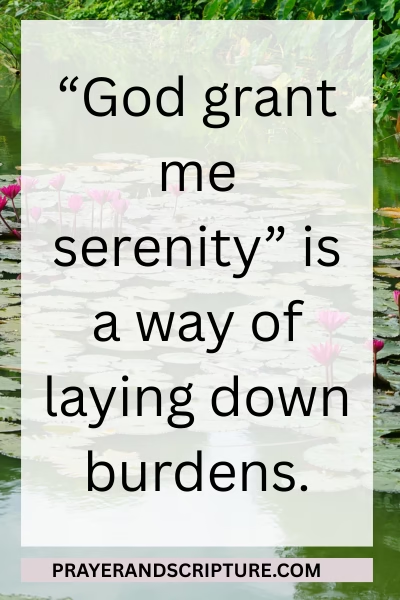
In daily life, praying “God grant me serenity” is a way of laying down burdens. It reminds us to start the day with a calm spirit, rooted not in circumstances but in faith. This serenity doesn’t remove problems, but it transforms how we face them—with trust, patience, and resilience.
Ultimately, serenity is the fruit of abiding in Christ. When we pray these words sincerely, we experience the daily peace that only God can provide, enabling us to walk through life with a steady heart and unwavering faith.
Interpreting Courage in the Serenity Prayer for Everyday Struggles
The second line of the Serenity Prayer—“Courage to change the things I can”—is a reminder that Christian faith is not passive. It calls us to step into life’s struggles with boldness, relying on God’s strength to act where He has given us influence and responsibility.
Courage in this prayer is not reckless bravery; it is Spirit-led obedience. Many daily struggles—whether breaking free from unhealthy habits, mending relationships, or choosing righteousness over compromise—require courage. This prayer reminds us that God empowers us to make necessary changes in our lives. Joshua 1:9 (NIV): “Have I not commanded you? Be strong and courageous. Do not be afraid; do not be discouraged, for the Lord your God will be with you wherever you go.”
Courage also involves perseverance. Some struggles cannot be overcome in a single day. It takes consistent faith and action to move forward. For example, forgiving someone who hurt you deeply may take time, but each step of obedience strengthens your spirit. 2 Corinthians 12:9 (ESV): “My grace is sufficient for you, for my power is made perfect in weakness.” God’s grace turns our weakness into strength, giving us the courage to continue pressing on.
In everyday life, courage might mean speaking truth when silence feels safer, resisting temptation when compromise looks easier, or taking bold steps toward a God-given dream. This is not human willpower—it is God’s power flowing through a surrendered life.
By interpreting courage in the Serenity Prayer, we understand that God equips us not just to endure but to actively shape our lives in alignment with His will. Each time we pray these words, we are reminded to rise above fear, take responsibility where we can, and trust God to strengthen us for the journey.
The Wisdom of the Serenity Prayer and Its Application Today
The final line of the Serenity Prayer—“And wisdom to know the difference”—is what ties the entire prayer together. Without wisdom, we may either give up too easily on things we are meant to change or exhaust ourselves trying to control what is beyond us. Wisdom is the balance between surrender and courage, and it is as vital today as ever.
In Scripture, wisdom is not mere knowledge; it is the ability to apply God’s truth in practical decisions. James 1:5 (NIV): “If any of you lacks wisdom, you should ask God, who gives generously to all without finding fault, and it will be given to you.” This verse reminds us that wisdom is a divine gift, freely available to all who ask.

Applying the Serenity Prayer today means pausing to discern: Is this a moment to let go and trust God, or a moment to act with courage? For instance, we cannot control a loved one’s choices, but we can control how we respond—with love, patience, and prayer. We cannot stop life’s storms, but we can choose to anchor ourselves in God’s promises. At the same time, wisdom teaches us to act boldly in areas like pursuing reconciliation, resisting sin, or making decisions that align with God’s purpose.
The application of this wisdom in modern life extends to stress, relationships, finances, and personal growth. In a culture that glorifies control, the Serenity Prayer calls us back to a Christ-centered balance—accept what you cannot change, act where you must, and seek God’s wisdom for everything in between.
By praying this daily, we gain clarity, avoid wasted energy, and grow in trust. The Serenity Prayer reminds us that wisdom is not just about decision-making; it is about living in step with God’s Spirit. Proverbs 4:7 (ESV): “The beginning of wisdom is this: Get wisdom, and whatever you get, get insight.”
How the Serenity Prayer Helps in Overcoming Anxiety and Stress
Anxiety and stress are daily battles for many people, but the Serenity Prayer offers a powerful antidote rooted in faith. Each line addresses the core issues that fuel our worry—lack of control, fear of change, and uncertainty about what to do.
The prayer begins with surrender: “God, grant me the serenity to accept the things I cannot change.” Much of our anxiety comes from trying to control the uncontrollable. The Serenity Prayer reminds us to hand these burdens over to God. 1 Peter 5:7 (NIV): “Cast all your anxiety on him because he cares for you.” When we release control, God replaces worry with His peace.
Next comes empowerment: “Courage to change the things I can.” Stress often paralyzes us, but God calls us to act where we can. This might mean setting boundaries, choosing healthier habits, or stepping away from harmful environments. Courage shifts us from helplessness to faith-filled action. Philippians 4:13 (ESV): “I can do all things through him who strengthens me.”
Finally, the prayer seeks clarity: “And wisdom to know the difference.” Much stress comes from not knowing whether to fight or let go. Wisdom, granted by God, helps us prioritize what truly matters. It prevents us from wasting energy on what we cannot fix while focusing on what we can faithfully do. Proverbs 3:5–6 (NIV): “Trust in the Lord with all your heart and lean not on your own understanding; in all your ways submit to him, and he will make your paths straight.”
In daily life, praying the Serenity Prayer shifts our perspective. Instead of being overwhelmed by anxiety, we find balance—surrendering what belongs to God, taking courage in what He calls us to do, and seeking wisdom for everything in between. It doesn’t erase challenges, but it equips us to face them with peace and trust.
Serenity Prayer Meaning in Addiction Recovery and Healing
The Serenity Prayer has become a cornerstone in addiction recovery programs around the world, especially through its use in Alcoholics Anonymous (AA) and other twelve-step fellowships. Its meaning speaks directly to the heart of healing, where surrender, courage, and wisdom are vital for lasting freedom.
The first line, “God, grant me the serenity to accept the things I cannot change,” acknowledges human limitation. In recovery, the hardest step is admitting that one cannot overcome addiction by sheer willpower. This acceptance is not defeat but the first step toward healing. 2 Corinthians 12:10 (NIV): “For when I am weak, then I am strong.” Serenity comes when we admit our weakness and allow God to take control.
The second line, “Courage to change the things I can,” reflects the action required in recovery. Healing is not passive; it requires daily courage to make new choices, resist temptation, and walk in accountability. Change may feel daunting, but God equips us with His Spirit. Ezekiel 36:26 (ESV): “And I will give you a new heart, and a new spirit I will put within you.” This courage is not found in self-determination but in God’s transforming power.

The final line, “And wisdom to know the difference,” is key in recovery. Not every battle can be fought the same way. Wisdom helps individuals discern between letting go of past regrets and taking responsibility for present actions. It guides them to focus on the steps they can take today while trusting God with what lies beyond their control. James 3:17 (NIV): “But the wisdom that comes from heaven is first of all pure; then peace-loving, considerate, submissive, full of mercy and good fruit, impartial and sincere.”
In the context of recovery, the Serenity Prayer is not just recited—it is lived. It becomes a daily surrender to God’s grace, a source of strength for transformation, and a compass for walking in freedom. Through this prayer, countless lives have found hope, healing, and a renewed sense of purpose.
Practical Ways to Apply the Serenity Prayer in Daily Decisions
The Serenity Prayer is not only a source of comfort in times of crisis; it is also a practical guide for making everyday decisions. Life is filled with choices—big and small—that can shape our spiritual growth and overall peace. Applying the prayer daily helps us navigate these moments with clarity and faith.
The first step is acceptance: “God, grant me the serenity to accept the things I cannot change.” Before making decisions, ask yourself: Is this something within my control? For example, you cannot control someone else’s reaction, but you can control your response. Learning to let go of uncontrollable factors reduces frustration and allows you to focus on what matters. Psalm 37:7 (NIV): “Be still before the Lord and wait patiently for him; do not fret when people succeed in their ways, when they carry out their wicked schemes.”
The second step is courage: “Courage to change the things I can.” Practical application here means taking responsibility for areas where God has given you influence. This may include adjusting your priorities, creating healthy routines, or making difficult but necessary decisions. Courage is about action—choosing God’s way even when it’s hard. James 1:22 (ESV): “But be doers of the word, and not hearers only, deceiving yourselves.”
The third step is wisdom: “And wisdom to know the difference.” Before deciding, pray for discernment. Wisdom helps you see whether a situation calls for patience, boldness, or surrender. It also helps you prioritize, ensuring you’re not wasting energy on things that distract from God’s will. Colossians 3:16 (NIV): “Let the message of Christ dwell among you richly… with all wisdom.”
In practice, this means pausing to pray the Serenity Prayer before responding to conflict, making financial choices, or planning your day. Over time, these words shape a decision-making framework rooted in faith. By applying the Serenity Prayer daily, believers grow in peace, resilience, and alignment with God’s will.
Spiritual Interpretation of the Serenity Prayer for Inner Strength
The first petition, “God, grant me the serenity to accept the things I cannot change,” teaches spiritual surrender. This is not a weakness, but a strength that comes from trusting God’s sovereignty. When we release what is beyond our control, our spirit is renewed. Isaiah 40:31 (NIV): “But those who hope in the Lord will renew their strength. They will soar on wings like eagles; they will run and not grow weary, they will walk and not be faint.” Serenity is the fruit of relying on God’s power, not our own.
The second request, “Courage to change the things I can,” highlights the spiritual strength required for transformation. Courage is more than human determination; it is faith in action. Inner strength grows when we step forward in obedience, even when it feels risky or uncomfortable. 2 Timothy 1:7 (ESV): “For God gave us a spirit not of fear but of power and love and self-control.” This courage equips us to resist temptation, pursue holiness, and take bold steps aligned with God’s will.
The final line, “And wisdom to know the difference,” reflects the gift of discernment that anchors spiritual strength. Inner strength is not about doing everything, but about choosing God’s path in every situation. Wisdom allows us to preserve our energy for what matters most and remain steadfast in faith. Proverbs 24:5 (NIV): “The wise prevail through great power, and those who know muster their strength.”
Spiritually, the Serenity Prayer is a daily invitation to draw strength from God. It builds resilience by teaching us when to yield, when to act, and how to trust God in both. With this balance, our inner life is fortified, and we walk with unshakable confidence in the Lord.
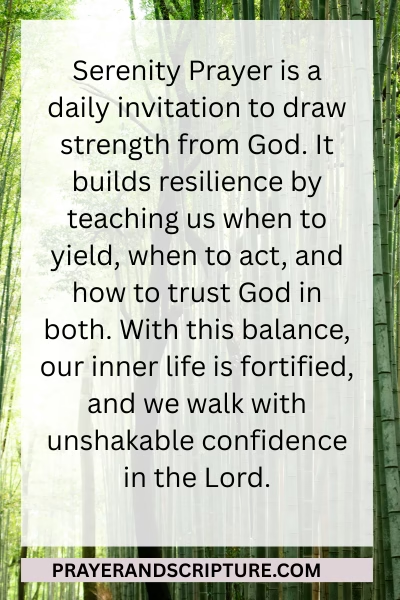
Serenity Prayer as a Guide to Christian Faith and Trust in God
The Serenity Prayer is not just a personal reflection; it is a guiding light for Christians who desire to walk in faith and trust in God. Its words remind us that true serenity comes when we place our confidence in the Lord’s wisdom, not in our limited understanding.
The first petition, “God, grant me the serenity to accept the things I cannot change,” teaches us to trust God’s sovereignty. There will always be circumstances beyond our control—illness, loss, or delays in answered prayers. But Christian faith rests in knowing that God works all things together for good. Romans 8:28 (NIV): “And we know that in all things God works for the good of those who love him, who have been called according to his purpose.” Serenity is an expression of trust that God is present, even in trials.
The second part, “Courage to change the things I can,” shows us that trust in God does not mean passivity. Faith moves us to act with courage in areas where God calls us to grow. Whether it’s forgiving others, breaking unhealthy patterns, or pursuing righteousness, Christian trust empowers us to act boldly. Joshua 1:9 (ESV): “Be strong and courageous. Do not be frightened, and do not be dismayed, for the Lord your God is with you wherever you go.” Trust becomes courage when anchored in God’s presence.
Finally, “And wisdom to know the difference,” highlights discernment as a mark of faith. Trusting God means listening for His direction and walking in step with His Spirit. This wisdom protects us from wasted effort and helps us lean into God’s perfect timing. Proverbs 3:5–6 (NIV): “Trust in the Lord with all your heart and lean not on your own understanding; in all your ways submit to him, and he will make your paths straight.”
Ultimately, the Serenity Prayer is a practical guide to living with Christian trust. It reminds us that faith is not just belief, but daily reliance—yielding to God’s control, acting with His courage, and following His wisdom.
Finding Peace Through the Serenity Prayer in Troubled Times
Life is filled with seasons of uncertainty, hardship, and sorrow. In such moments, the Serenity Prayer becomes more than words—it becomes a source of peace in troubled times. Its simple yet profound petitions help us anchor our hearts in God when chaos threatens to overwhelm us.
The opening line, “God, grant me the serenity to accept the things I cannot change,” teaches surrender during trials. When faced with loss, betrayal, or unexpected challenges, acceptance does not mean defeat—it means trusting God’s greater plan. This surrender ushers in peace that surpasses human logic. Philippians 4:7 (NIV): “And the peace of God, which transcends all understanding, will guard your hearts and your minds in Christ Jesus.”
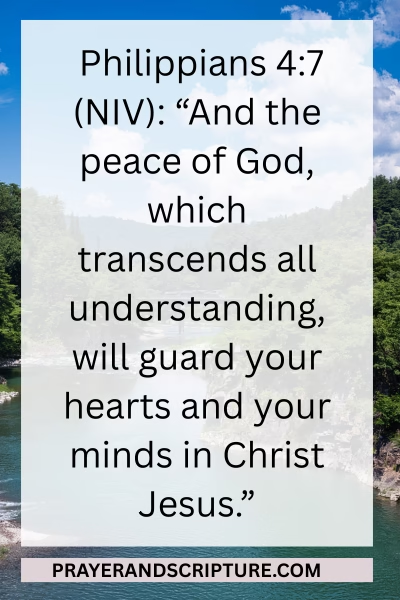
The second part, “Courage to change the things I can,” inspires us not to be crushed by hardship but to rise with faith. Peace does not come from avoidance, but from courage to take Spirit-led action. This may mean seeking reconciliation, asking for help, or persevering in prayer. John 16:33 (NIV): “In this world you will have trouble. But take heart! I have overcome the world.” In Christ, courage and peace go hand in hand.
Finally, “And wisdom to know the difference,” brings clarity amid confusion. Troubled times often cloud our judgment, tempting us toward panic or despair. But wisdom steadies our hearts, helping us focus on what God has placed in our hands while releasing what only He can carry. James 1:5 (ESV): “If any of you lacks wisdom, let him ask God, who gives generously to all without reproach, and it will be given him.”
Through this prayer, we discover that peace is not the absence of trouble but the presence of God’s serenity, courage, and wisdom. The Serenity Prayer becomes a lifeline, reminding us that even in storms, God’s peace remains unshakable.
Daily Life Applications of the Serenity Prayer’s Meaning
The beauty of the Serenity Prayer lies not only in its words but in its practical application for daily living. When embraced each day, it becomes a guide for navigating decisions, relationships, and challenges with a heart anchored in God’s wisdom and peace.
The first petition, “God, grant me the serenity to accept the things I cannot change,” is a call to practice contentment. In daily life, this might look like accepting delays, setbacks, or inconveniences without losing peace. Instead of reacting with frustration, we remember that God is in control. Psalm 46:10 (NIV): “Be still, and know that I am God.” By pausing to rest in His sovereignty, serenity becomes a way of life.
The second line, “Courage to change the things I can,” speaks to taking faith-driven responsibility. Daily application may mean choosing kindness when tempted to be harsh, stepping out in faith toward a new opportunity, or confronting unhealthy habits with determination. Courage in the small, everyday choices shapes us into people who live boldly for Christ. Galatians 6:9 (ESV): “And let us not grow weary of doing good, for in due season we will reap, if we do not give up.”
Finally, “And wisdom to know the difference,” reminds us to practice discernment each day. Whether deciding how to spend time, handle money, or resolve conflict, wisdom protects us from wasted energy and wrong turns. Proverbs 2:6 (NIV): “For the Lord gives wisdom; from his mouth come knowledge and understanding.” Seeking His guidance daily ensures that we walk in alignment with His will.
By applying the Serenity Prayer’s meaning to everyday life, we cultivate peace, courage, and wisdom as habits, not occasional responses. It becomes a spiritual compass, helping us reflect Christ in our words, actions, and decisions.
How the Serenity Prayer Helps in Relationships and Forgiveness
Relationships can be both life-giving and challenging. Misunderstandings, disappointments, and conflicts often test our hearts. The Serenity Prayer provides a framework for navigating relationships with grace, forgiveness, and wisdom rooted in God’s Word.
The first line, “God, grant me the serenity to accept the things I cannot change,” is essential in relationships. We cannot control others their choices, actions, or attitudes. Serenity helps us accept this truth and frees us from the burden of trying to “fix” people. Instead, we entrust them to God. Romans 12:18 (NIV): “If it is possible, as far as it depends on you, live at peace with everyone.” Peace begins when we release control and allow God to work in others.
The second part, “Courage to change the things I can,” reminds us of our responsibility to take action in relationships. This may mean apologizing, setting healthy boundaries, or offering forgiveness even when it’s hard. Forgiveness often requires great courage because it asks us to let go of hurt. Ephesians 4:32 (ESV): “Be kind to one another, tenderhearted, forgiving one another, as God in Christ forgave you.” Courage is love in motion.
Finally, “And wisdom to know the difference,” applies beautifully in relationships. Wisdom teaches us when to speak and when to remain silent, when to pursue reconciliation and when to step back. It helps us balance truth with grace and protect our hearts without hardening them. James 3:17 (NIV): “But the wisdom that comes from heaven is first of all pure; then peace-loving, considerate, submissive, full of mercy and good fruit, impartial and sincere.”
When applied to relationships, the Serenity Prayer helps us release control, embrace courage, and extend forgiveness. It transforms conflicts into opportunities for grace and strengthens bonds through God’s peace and wisdom.
The Connection Between the Serenity Prayer and Christian Hope
At its core, the Serenity Prayer is not just about peace in the present—it also points us to Christian hope, the confident expectation that God is working all things for good and that His promises will prevail. Hope strengthens the believer’s heart, even when circumstances seem overwhelming.
The first petition, “God, grant me the serenity to accept the things I cannot change,” reflects hope in God’s sovereignty. Acceptance is not resignation; it is trust that God has a plan, even in what we cannot control. This mirrors the hope expressed in Jeremiah 29:11 (NIV): “For I know the plans I have for you, declares the Lord, plans to prosper you and not to harm you, plans to give you hope and a future.” Serenity flows from knowing the future rests securely in His hands.
The second line, “Courage to change the things I can,” embodies active hope. Courageous steps are acts of faith that God’s promises are true. Whether it’s overcoming sin, pursuing healing, or working toward restoration, these choices demonstrate a hopeful trust in God’s transforming power. Romans 15:13 (ESV): “May the God of hope fill you with all joy and peace in believing, so that by the power of the Holy Spirit you may abound in hope.”
Finally, “And wisdom to know the difference,” shows us that hope is guided by discernment. Christian hope is not wishful thinking—it is rooted in God’s truth. Wisdom helps us recognize where to wait on God with patience and where to act with faith. This balance keeps our hope steady, preventing discouragement or burnout.
The Serenity Prayer, then, is more than a request for peace—it is a daily expression of hope in Christ. It reminds us that while life holds challenges, we look forward with confidence to God’s faithful provision, knowing He is writing a story of redemption.
Why Christians Use the Serenity Prayer in Times of Suffering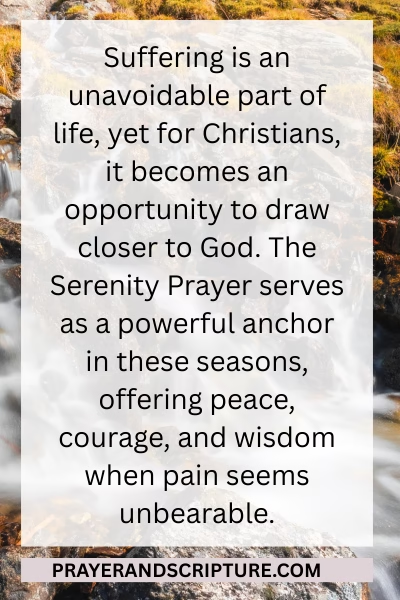
Suffering is an unavoidable part of life, yet for Christians, it becomes an opportunity to draw closer to God. The Serenity Prayer serves as a powerful anchor in these seasons, offering peace, courage, and wisdom when pain seems unbearable.
The first request, “God, grant me the serenity to accept the things I cannot change,” acknowledges the reality that not all suffering can be removed immediately. Some trials remain for a time, but serenity allows us to endure with faith instead of despair. Acceptance does not mean giving up—it means trusting God’s plan even when we cannot understand it. 2 Corinthians 12:9 (NIV): “My grace is sufficient for you, for my power is made perfect in weakness.” This serenity helps believers experience God’s sustaining grace in hardship.
The second petition, “Courage to change the things I can,” empowers us not to be crushed by suffering but to respond with faith. This courage may mean seeking medical help, pursuing reconciliation, or persevering in prayer. It may also mean refusing to allow suffering to harden our hearts. Psalm 31:24 (ESV): “Be strong, and let your heart take courage, all you who wait for the Lord!” In suffering, courage keeps hope alive.
Finally, “And wisdom to know the difference,” provides discernment when suffering clouds judgment. Wisdom helps us distinguish between what must be entrusted fully to God and what requires faithful action on our part. James 1:5 (NIV): “If any of you lacks wisdom, you should ask God, who gives generously to all without finding fault, and it will be given to you.” This wisdom protects us from hopelessness and aligns us with God’s purposes.
Christians turn to the Serenity Prayer in suffering because it reminds them that God’s presence is their greatest comfort. It transforms pain into prayer and sorrow into trust, assuring believers that even in the valley, the Shepherd walks beside them.
The Role of the Serenity Prayer in Overcoming Fear and Anxiety
Fear and anxiety are struggles that touch nearly everyone at some point. They arise from uncertainty, loss of control, or overwhelming pressures. The Serenity Prayer offers a powerful antidote, guiding believers to exchange worry for faith, and panic for peace rooted in God’s promises.
The first line, “God, grant me the serenity to accept the things I cannot change,” helps calm anxiety by teaching surrender. Much of fear is fueled by trying to control the uncontrollable. Serenity comes when we release those burdens to God. 1 Peter 5:7 (NIV): “Cast all your anxiety on him because he cares for you.” Trusting God with what we cannot manage replaces fear with divine peace.
The second part, “Courage to change the things I can,” directly counters fear’s paralyzing grip. Anxiety often convinces us to stay stuck, but courage empowers us to act in faith. Taking even small steps—praying, seeking support, or choosing hope over despair—breaks fear’s hold. Isaiah 41:10 (ESV): “Fear not, for I am with you; be not dismayed, for I am your God; I will strengthen you, I will help you, I will uphold you with my righteous right hand.” God’s presence gives the courage needed to face what once felt impossible.
Finally, “And wisdom to know the difference,” helps discern between real threats and imagined fears. Many anxieties are born from “what ifs.” Wisdom grounds us in truth, reminding us that God is faithful and His Word is greater than our worries. Philippians 4:6-7 (NIV): “Do not be anxious about anything, but in every situation, by prayer and petition, with thanksgiving, present your requests to God. And the peace of God… will guard your hearts and your minds in Christ Jesus.”
The Serenity Prayer becomes a spiritual tool for overcoming fear and anxiety, leading us into peace, courage, and clarity. By praying it daily, we replace fear with trust, and anxiety with unshakable faith in Christ.
Serenity Prayer Meaning for Christian Perseverance and Endurance
Perseverance and endurance are essential qualities for Christians walking through life’s challenges. The Serenity Prayer strengthens believers by offering a Christ-centered framework for pressing on with faith, even when the journey feels long and difficult.
The opening petition, “God, grant me the serenity to accept the things I cannot change,” equips us for endurance by teaching us to yield to God’s sovereignty. Not every obstacle will be removed immediately, but serenity allows us to rest in God’s timing. This surrender keeps us from growing weary in spirit. Hebrews 10:36 (NIV): “You need to persevere so that when you have done the will of God, you will receive what he has promised.” Accepting God’s control enables us to endure with peace.
The second request, “Courage to change the things I can,” fuels perseverance with action. Endurance is not passive waiting—it is active faith. Courage keeps us moving forward despite opposition, setbacks, or fatigue. Whether it’s continuing in prayer, resisting temptation, or serving faithfully, this courage builds spiritual endurance. Galatians 6:9 (ESV): “And let us not grow weary of doing good, for in due season we will reap, if we do not give up.” Courage sustains perseverance until breakthrough comes.
The final part, “And wisdom to know the difference,” offers balance. Without wisdom, endurance can turn into burnout or misplaced effort. Wisdom helps us focus on God’s assignments and let go of unnecessary burdens. This discernment strengthens endurance by aligning us with God’s will. James 1:12 (NIV): “Blessed is the one who perseveres under trial because, having stood the test, that person will receive the crown of life that the Lord has promised to those who love him.”
Through its meaning, the Serenity Prayer teaches Christians that perseverance is not about gritting our teeth but about leaning into God’s peace, courage, and wisdom. It transforms endurance from a burden into a testimony of faith in God’s unfailing promises.
How the Serenity Prayer Encourages Humility Before God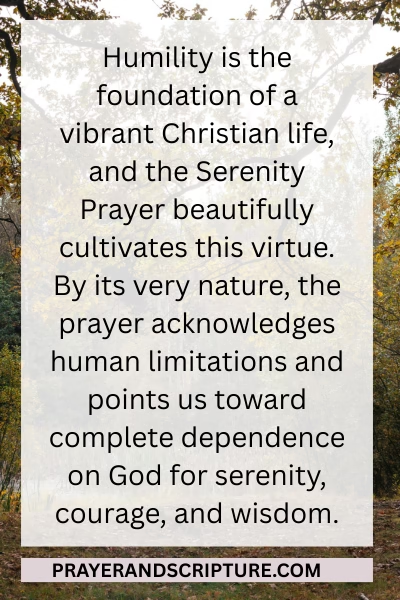
Humility is the foundation of a vibrant Christian life, and the Serenity Prayer beautifully cultivates this virtue. By its very nature, the prayer acknowledges human limitations and points us toward complete dependence on God for serenity, courage, and wisdom.
The opening request, “God, grant me the serenity to accept the things I cannot change,” is a humble admission that we are not in control. Pride resists this truth, but humility bows before God’s sovereignty, trusting Him to handle what is beyond our reach. 1 Peter 5:6 (NIV): “Humble yourselves, therefore, under God’s mighty hand, that he may lift you up in due time.” Serenity grows from surrender, and surrender is rooted in humility.
The second petition, “Courage to change the things I can,” reminds us that courage itself is a gift from God. Humility recognizes that we cannot rely on our strength alone but must lean on His Spirit for empowerment. 2 Corinthians 3:5 (ESV): “Not that we are sufficient in ourselves to claim anything as coming from us, but our sufficiency is from God.” Humble courage is powerful because it flows from God, not self.
Finally, “And wisdom to know the difference,” underscores the humility required to seek God’s guidance daily. Wisdom is not earned by intellect alone but given generously by the Lord. Proverbs 11:2 (NIV): “When pride comes, then comes disgrace, but with humility comes wisdom.” Asking for discernment each day shows that we recognize our need for God’s direction in every detail of life.
The Serenity Prayer is, at its core, a humble cry to God. It shifts the focus away from human pride and self-reliance, turning our hearts toward the One who holds all wisdom, strength, and peace. In humility, we find the posture that allows God to shape us into vessels of His grace.
The Serenity Prayer and the Pursuit of God’s Will
Every believer desires to walk in God’s perfect will, yet discerning it can often feel challenging. The Serenity Prayer becomes a powerful tool in this pursuit, reminding us that true wisdom and peace come only when our hearts are aligned with the Lord’s guidance.
The first petition, “God, grant me the serenity to accept the things I cannot change,” reflects a surrender to God’s will. Sometimes His plans include seasons we may not fully understand, yet serenity teaches us to rest in His sovereignty. Romans 12:2 (NIV): “Do not conform to the pattern of this world, but be transformed by the renewing of your mind. Then you will be able to test and approve what God’s will is—his good, pleasing and perfect will.” Accepting what God ordains is an act of faith in His higher purpose.
The second request, “Courage to change the things I can,” represents obedience to God’s will. Once His direction is revealed, courage helps us act on it, even when it requires sacrifice, perseverance, or going against the current of the world. Joshua 1:7 (ESV): “Only be strong and very courageous, being careful to do according to all the law that Moses my servant commanded you.” God’s will is not always the easy path, but it is always the right one.
Finally, “And wisdom to know the difference,” speaks to discernment in the pursuit of God’s will. Without wisdom, we may confuse our desires with His plan. Wisdom keeps us rooted in prayer, Scripture, and the leading of the Holy Spirit. Colossians 1:9 (NIV): “We continually ask God to fill you with the knowledge of his will through all the wisdom and understanding that the Spirit gives.”
The Serenity Prayer, therefore, is more than a request for peace—it is a daily surrender to God’s will. It calls us to yield, to act, and to seek discernment, ensuring that our lives reflect His purpose and glory.
Living Out the Serenity Prayer as a Christian Lifestyle
The Serenity Prayer is more than a short petition; it is a framework for living a Christ-centered lifestyle. When embraced daily, it shapes how we respond to challenges, pursue growth, and walk humbly with God.
The first line, “God, grant me the serenity to accept the things I cannot change,” reflects a lifestyle of trust. Instead of living in frustration or resistance, Christians who embody this prayer choose to rest in God’s sovereignty. This means practicing patience in waiting seasons and learning to lean on His promises. Isaiah 26:3 (NIV): “You will keep in perfect peace those whose minds are steadfast, because they trust in you.” Serenity becomes a mark of steady faith.
The second request, “Courage to change the things I can,” calls believers to live actively and boldly for Christ. A Christian lifestyle shaped by this prayer is not passive—it is courageous. Whether it’s choosing forgiveness over bitterness, service over selfishness, or holiness over compromise, this courage reflects a life fully surrendered to God. 1 Corinthians 16:13 (ESV): “Be watchful, stand firm in the faith, act like men, be strong.” Courage is the fruit of faith in action.
Finally, “And wisdom to know the difference,” creates a lifestyle guided by discernment. Christians living out this prayer seek God’s wisdom in decisions—large or small. They avoid extremes of recklessness or fear and instead walk in balance, relying on the Spirit’s leading. Proverbs 3:6 (NIV): “In all your ways submit to him, and he will make your paths straight.”
To live out the Serenity Prayer is to embrace peace, courage, and wisdom as daily companions. It is to walk humbly before God, trusting Him with what we cannot control, acting boldly where He calls us, and seeking His direction at every step. This is not just a prayer—it is a way of life in Christ.
Why the Serenity Prayer Matters for Every Believer
The Serenity Prayer has endured across generations because it speaks to the very heart of the Christian journey. Its timeless wisdom helps believers navigate life with peace, courage, and discernment, all while keeping their eyes fixed on God.
The first petition, “God, grant me the serenity to accept the things I cannot change,” matters because it calls us to trust God’s sovereignty. Life brings uncertainties, losses, and unanswered questions, but serenity is found in surrendering to the One who holds all things together. Psalm 55:22 (NIV): “Cast your cares on the Lord and he will sustain you; he will never let the righteous be shaken.”
The second request, “Courage to change the things I can,” is vital because Christian faith is not passive. Believers are called to live boldly, standing firm in righteousness, extending forgiveness, and pursuing God’s purposes. This courage reflects obedience to God’s call. Micah 6:8 (ESV): “He has told you, O man, what is good; and what does the Lord require of you but to do justice, and to love kindness, and to walk humbly with your God?”
The final line, “And wisdom to know the difference,” matters because discernment is central to spiritual growth. Every believer faces choices, and wisdom ensures that our steps align with God’s will. James 3:17 (NIV): “But the wisdom that comes from heaven is first of all pure; then peace-loving, considerate, submissive, full of mercy and good fruit, impartial and sincere.”
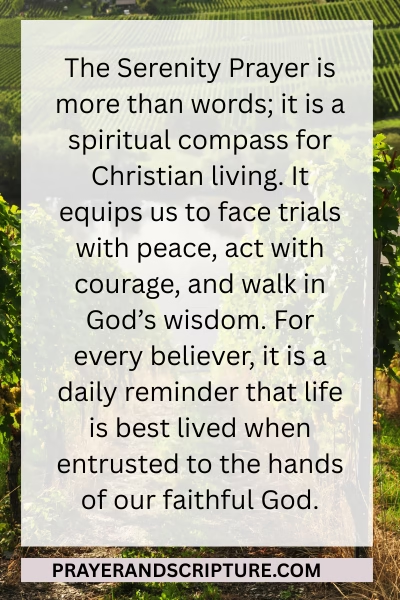
Ultimately, the Serenity Prayer is more than words—it is a spiritual compass for Christian living. It equips us to face trials with peace, act with courage, and walk in God’s wisdom. For every believer, it is a daily reminder that life is best lived when entrusted to the hands of our faithful God.
FAQs on the Serenity Prayer
1. What is the meaning of the Serenity Prayer?
The Serenity Prayer asks God for peace in accepting what cannot be changed, courage to make necessary changes, and wisdom to know the difference. It is rooted in Christian faith and Scripture, helping believers trust God and live with clarity.
2. Is the Serenity Prayer found in the Bible?
The exact words are not in the Bible, but the message reflects biblical principles such as trust in God (Proverbs 3:5-6), courage (Joshua 1:9), and wisdom (James 1:5).
3. Who wrote the Serenity Prayer?
The prayer was written by theologian Reinhold Niebuhr in the early 20th century, but its message is timeless and continues to inspire Christians worldwide.
4. Why is the Serenity Prayer important in daily life?
Because it helps believers face challenges with peace, courage, and discernment. It teaches surrender to God’s will while encouraging faithful action where change is possible.
5. Can I pray the Serenity Prayer every day?
Yes! The Serenity Prayer is powerful as a daily devotional prayer, especially when seeking God’s guidance, peace, and strength for life’s decisions.
Conclusion
The Serenity Prayer is more than just words—it is a spiritual lifestyle. Its timeless message calls us to embrace God’s peace, act with bold faith, and discern His will in every situation. By applying its wisdom daily, believers grow in trust, resilience, and spiritual maturity.
When life feels overwhelming, remember this truth: serenity comes from surrender, courage comes from obedience, and wisdom comes from walking closely with God. The Serenity Prayer reminds us that we are never alone—God’s strength, love, and guidance are always available.
May this prayer anchor your soul, shape your decisions, and draw you deeper into God’s presence. Live each day with peace, courage, and wisdom—just as the Serenity Prayer teaches.
